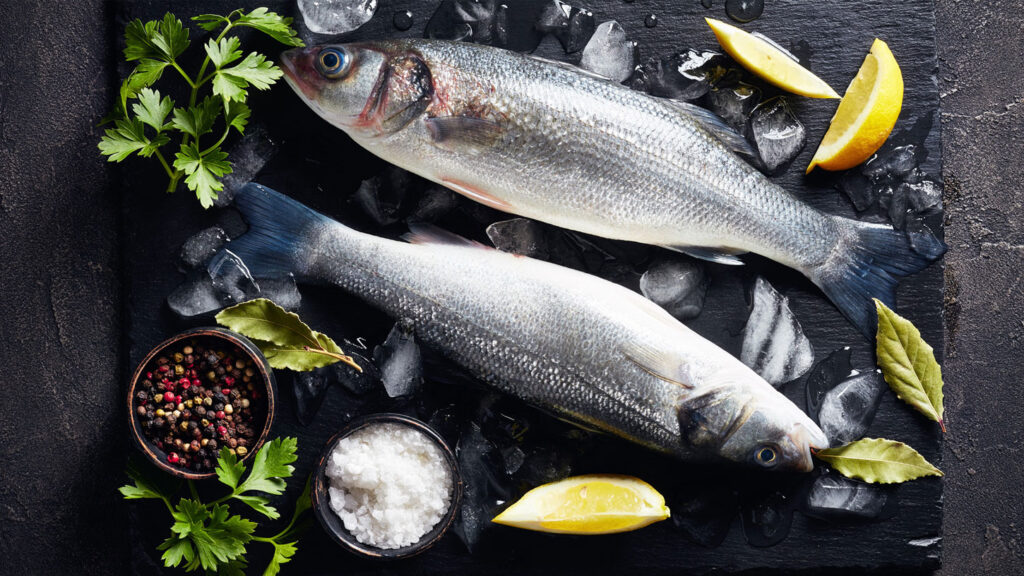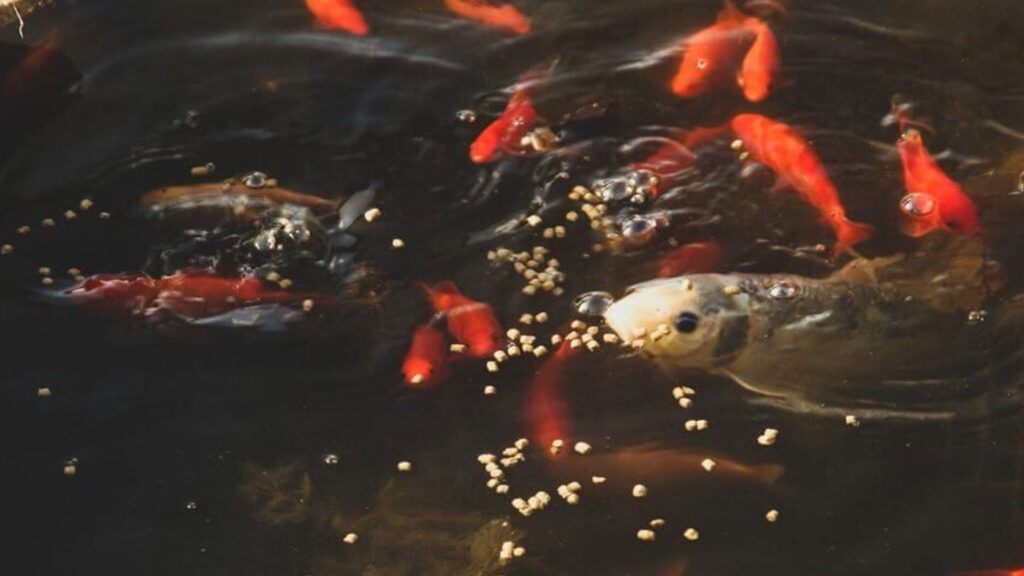Looking for fish food? Fish food is typically made with ingredients such as straw meal, soybean cake, peanut cake, corn protein powder, rice bran, and wheat bran.
There are various types of fish food, including flakes, pellets, sticks, and pellets. Flakes are the most common type of fish food and are easy to use. They float on the water’s surface, making it convenient for fish to feed.
Pellets sink to the bottom of the tank, providing a balanced and nutritious diet for fish. Sticks are designed for larger fish species and offer a slow-release formula. It’s important to choose the right type of fish food based on your fish species and their dietary needs.
The Importance Of Quality Fish Food For Optimal Health
Providing high-quality fish food is essential for ensuring the optimal health and longevity of your fish. When it comes to fish diet, choosing the right food is crucial. Different fish species require specific nutrients for growth and vitality. A balanced diet rich in proteins, vitamins, and minerals can promote healthy growth, vibrant colors, and overall well-being.
|
Understanding The Nutritional Needs Of Different Fish Species
|
When it comes to feeding fish, it’s essential to understand their varied dietary requirements based on whether they are freshwater or saltwater species. Different fish species have different nutritional needs, and tailoring their nutrition accordingly is crucial for their health and well-being. Key nutrients for goldfish, koi, and tropical fish Goldfish, koi, and tropical fish require specific key nutrients to thrive. They need a balanced diet that includes proteins, carbohydrates, fats, vitamins, and minerals. High-quality fish food formulated specifically for these species can provide the necessary nutrients for their growth, color enhancement, and overall health. Tailoring nutrition for specific species Each fish species has its own specific dietary preferences and requirements. It’s important to research and provide the appropriate type of fish food for specific species. Some fish prefer pellets, while others prefer flakes or live food. Understanding the needs of each species will help ensure their nutrition is properly tailored to their unique requirements. |

Factors To Consider When Selecting Fish Food
| Evaluating protein content and sources | When selecting fish food, it’s important to assess the protein content and sources. Look for fish food that contains a high protein percentage, as protein is essential for fish growth and overall health. Additionally, check the sources of protein to ensure they are high-quality and easily digestible for your fish. |
| Assessing fat and carbohydrate levels | In addition to protein, it’s also crucial to consider the fat and carbohydrate levels in fish food. Fish require a balanced diet, and excessive fat and carbohydrates can lead to health issues. Look for fish food with moderate levels of fat and carbohydrates to promote optimal fish health. |
| Choosing between pellets, flakes, and live food | When it comes to the type of fish food to choose from, there are several options available, including pellets, flakes, and live food. Each type has its advantages and disadvantages. Pellets are convenient and have a longer shelf life, flakes are suitable for surface-feeding fish, and live food provides a natural, stimulating diet. Consider the needs and feeding preferences of your fish when deciding. |
| Examining ingredient quality and additives | Lastly, examine the ingredient quality and additives in fish food. Look for fish food that contains high-quality ingredients, free from fillers and artificial additives. Avoid fish food with excessive coloring or chemical preservatives, as these can be harmful to fish. Opt for natural and nutritious options to ensure the well-being of your aquatic pets. |
Expert Tips For Feeding Fish Properly
Fish food is essential for the health and well-being of your aquatic pets. Establishing a regular feeding schedule is key to ensuring that your fish receive the nutrients they need without overfeeding them. Monitor portion sizes carefully, as overfeeding can lead to water pollution and health problems for your fish.
It’s important to understand the impact of temperature and water conditions on fish appetite. Fish have different feeding patterns depending on the temperature of the water. In warmer water, they tend to have a higher metabolism and may require more frequent feedings. In colder water, their metabolism slows down, and they may eat less.
Incorporating a balanced diet is crucial for the overall health of your fish. Look for fish food that contains a mix of proteins, fats, vitamins, and minerals. This will provide your fish with the necessary nutrients they need to thrive. Additionally, occasional treats such as freeze-dried or live foods can be given to your fish as a supplement to their regular diet.
Common Mistakes In Fish Feeding Practices
When it comes to fish-feeding practices, there are common mistakes that many fish owners make. One such mistake is overfeeding the fish, which can have detrimental consequences. Overfeeding can lead to issues such as poor water quality, fish obesity, and even death. It is important to feed fish in moderation, considering their nutritional requirements. Each fish species has different dietary needs, so it is crucial to do proper research and provide a balanced diet accordingly.
Another mistake is ignoring spoilage and expiration dates of fish food. Just like human food, fish food can go bad and lose its nutritional value over time. Feeding spoiled food to fish can lead to health problems and affect their overall well-being. Always check the expiration dates and discard any expired or spoiled food.
Lack of variety in the fish’s diet is also a common mistake. Just like humans, fish benefit from a diverse diet. Offering a variety of food types such as pellets, flakes, frozen or live food, and vegetables can provide essential nutrients and prevent nutritional deficiencies.

Supplementation And Supplementary Fish Food Products
Fish food supplementation plays a crucial role in filling nutritional gaps and ensuring the overall health and well-being of our aquatic pets. Supplements provide additional nutrients that may be lacking in their regular diet, helping to enhance their immune system, promote growth, and maintain vibrant colours. One popular option is freeze-dried or frozen fish food, which offers a convenient and nutritious solution for adding variety to their meals.
These options often include brine shrimp, bloodworms, and other natural ingredients that can be easily rehydrated and fed to the fish. Another option is to create DIY fish food recipes, allowing fish keepers to tailor the ingredients to meet the specific nutritional needs of their pets.
This can include using fresh vegetables, fruits, and protein sources like fish or shrimp. By supplementing their diet with these additional products, fish enthusiasts can ensure their pets receive a well-rounded and nutritionally balanced diet.
Regular Monitoring And Adjustments In Fish Feeding
Regular monitoring and adjustments in fish feeding are essential for ensuring the health and growth of your fish. Observing your fish’s behavior and appetite can give you valuable insight into their nutritional needs. You should track their growth and overall health to determine if any adjustments need to be made in their feeding routine. As your fish matures, their dietary requirements may change, so it is important to modify their feeding routine accordingly.
Frequently Asked Questions For Fish Food
What Is The Best Food For A Fish?
The best food for fish is a balanced diet that includes protein, fat, and minerals. Common types of fish food include flakes and freeze-dried options. Some popular ingredients in fish food are straw meal, soybean cake, peanut cake, corn protein powder, rice bran, and wheat bran.
What Foods Do Fish Eat?
Fish eat a variety of foods including flakes, freeze-dried, and pellet fish food. These foods typically contain protein, fat, and minerals, and are made from ingredients like straw meal, soybean cake, and corn protein powder.
What Can I Give My Fish As A Treat?
You can give your fish treats such as freeze-dried or frozen bloodworms, brine shrimp, or daphnia.
What Kind Of Food Do Aquarium Fish Eat?
Aquarium fish typically eat fish flakes or freeze-dried food. These types of fish food are easy to use and provide a balanced diet for the fish.
Conclusion
To maintain the health and vitality of your fish, it is crucial to provide them with the right fish food. From flakes to pellets, there are various types of fish food available to cater to the needs of different fish species.
Whether you choose freeze-dried or natural food, it is important to understand how to use them effectively. Remember that fish feed ingredients are derived from raw materials like soybean cake, rice bran, and wheat bran. So, make sure to choose fish food that is rich in protein, fat, and minerals to support the well-being of your aquatic companions.


